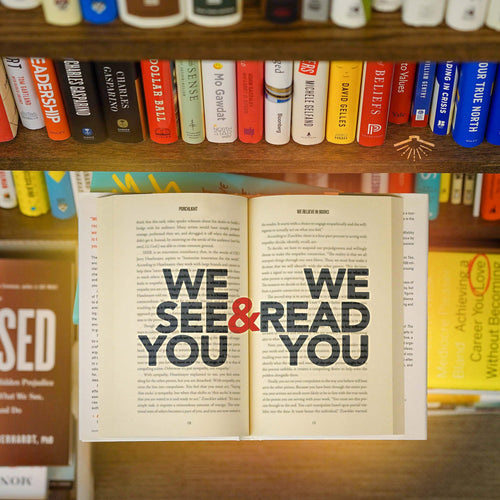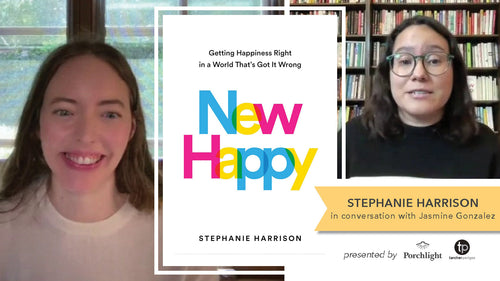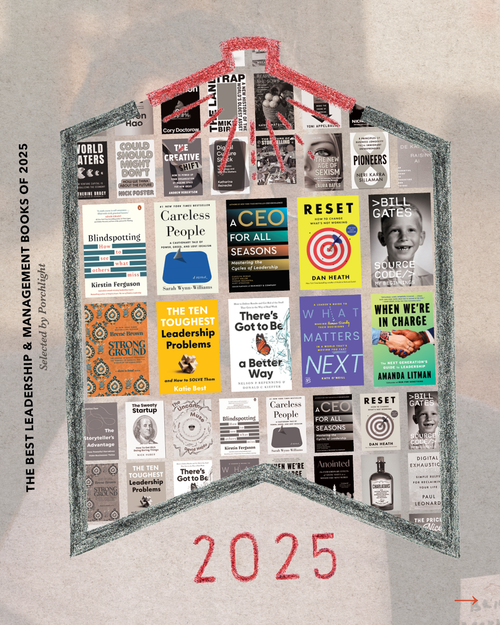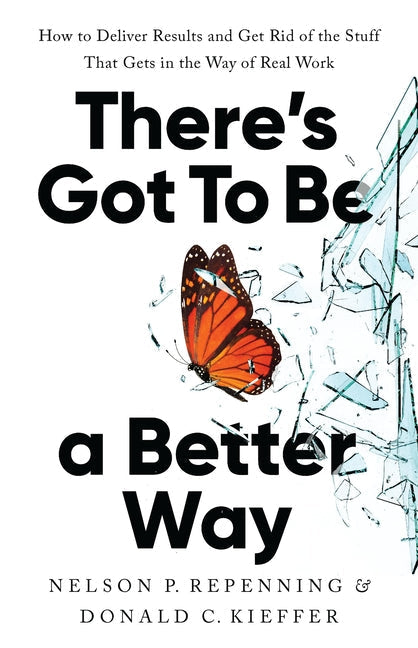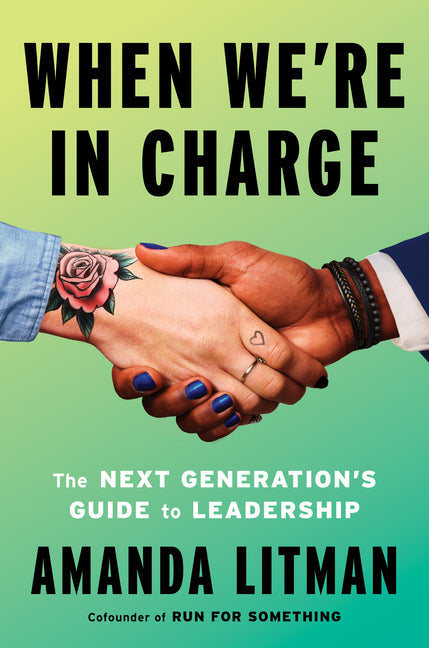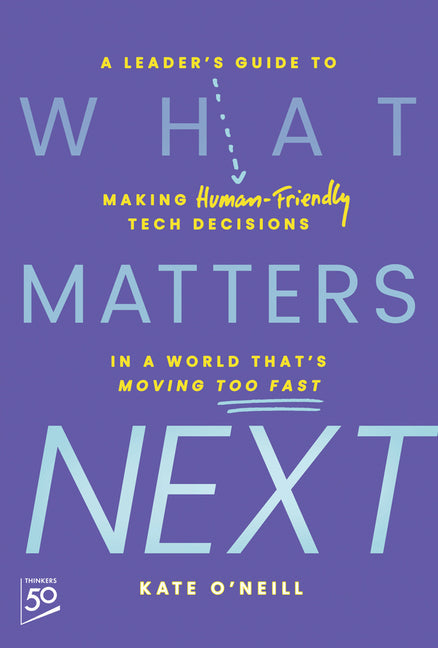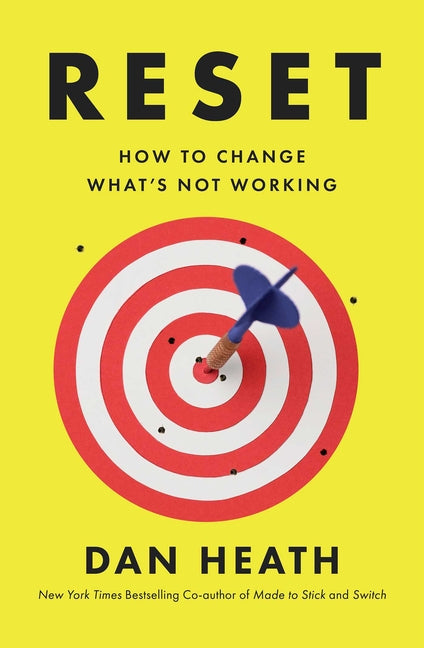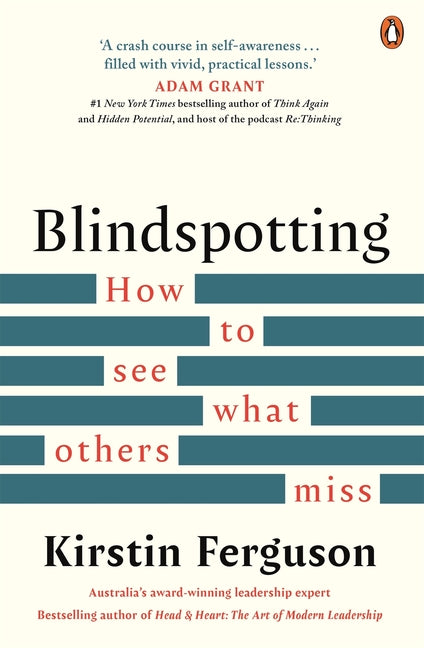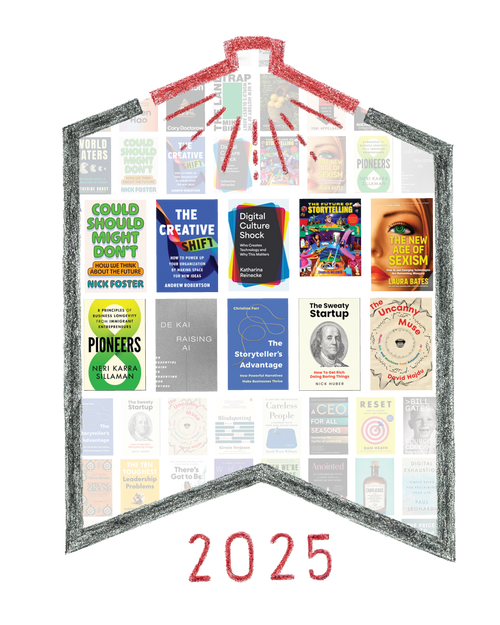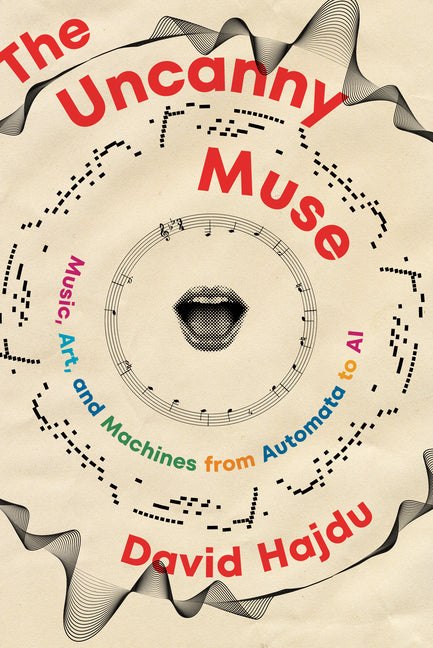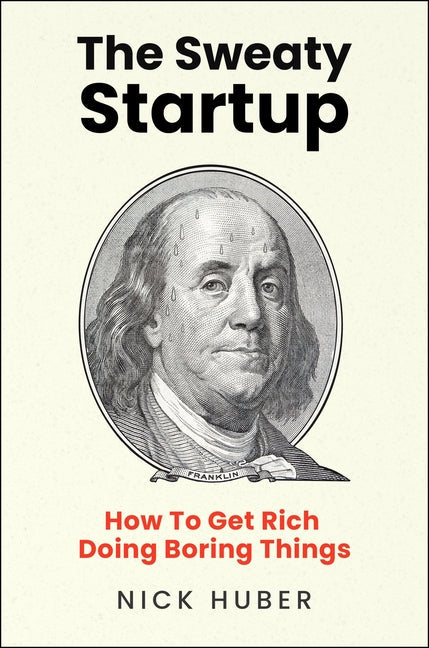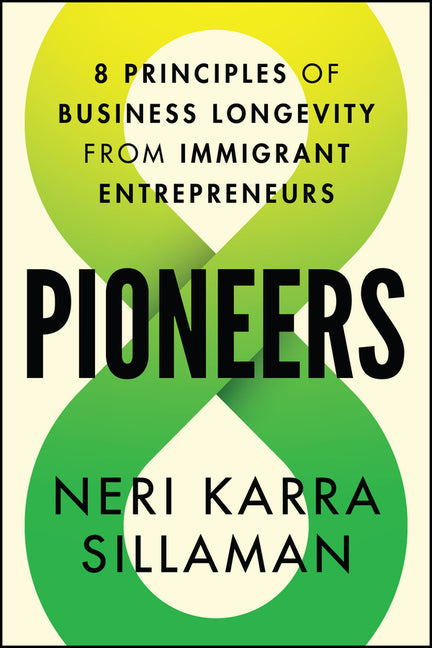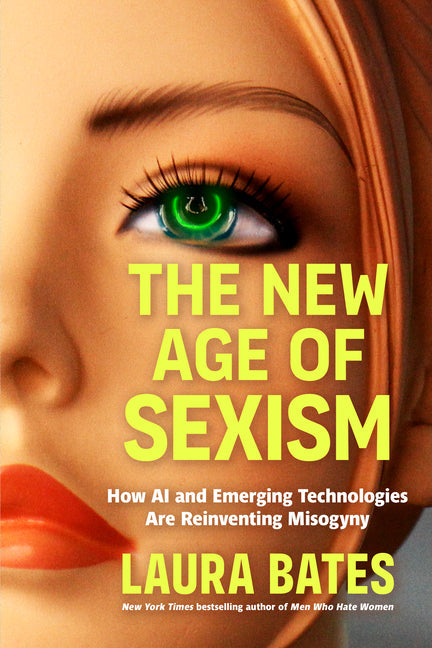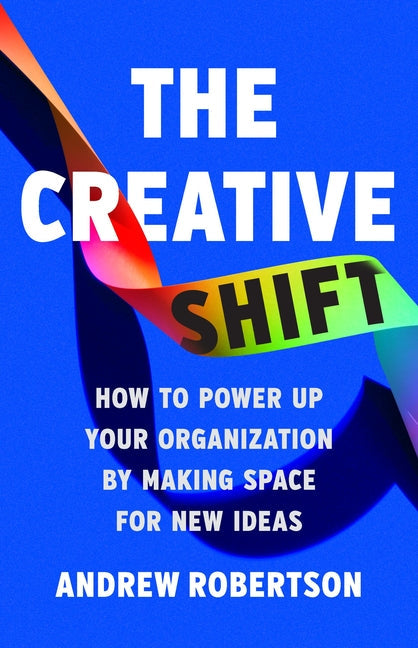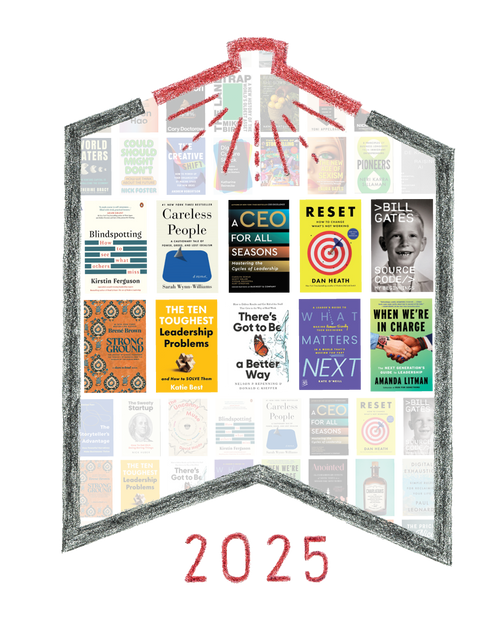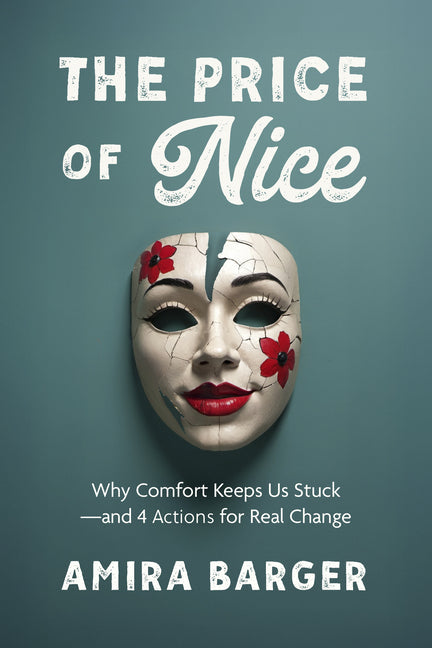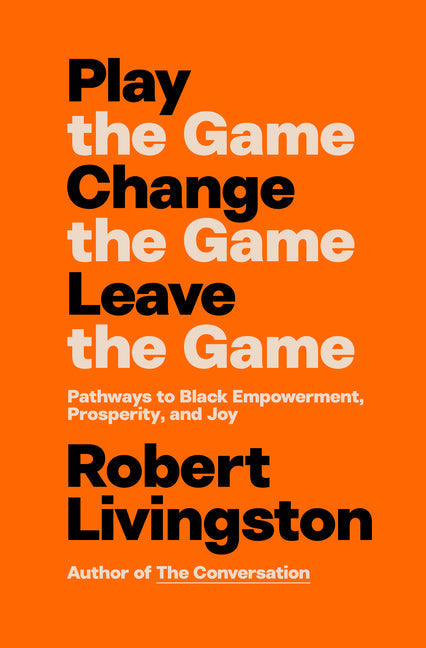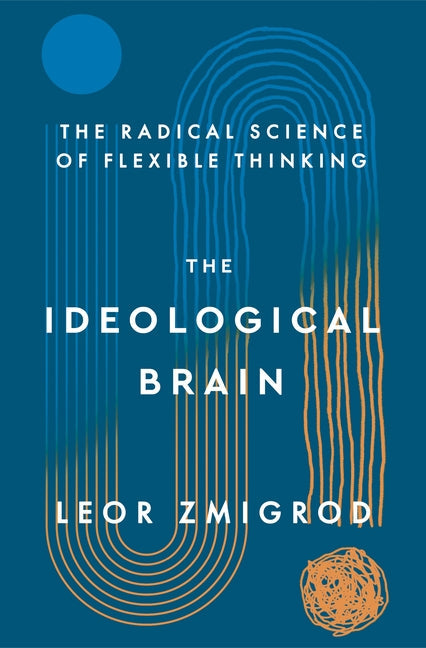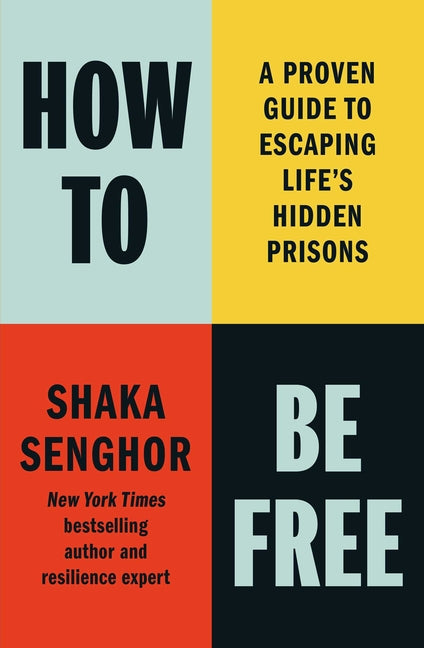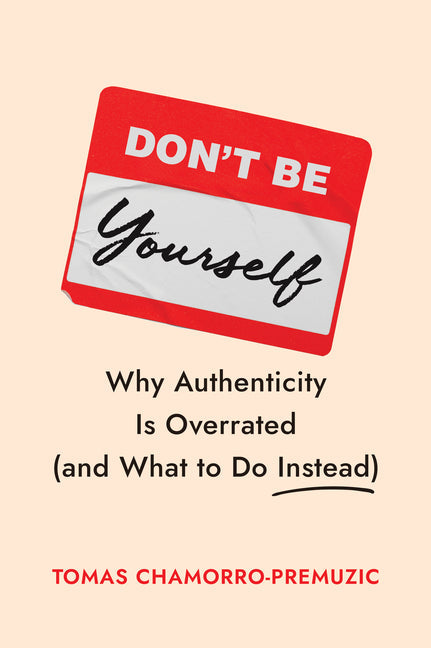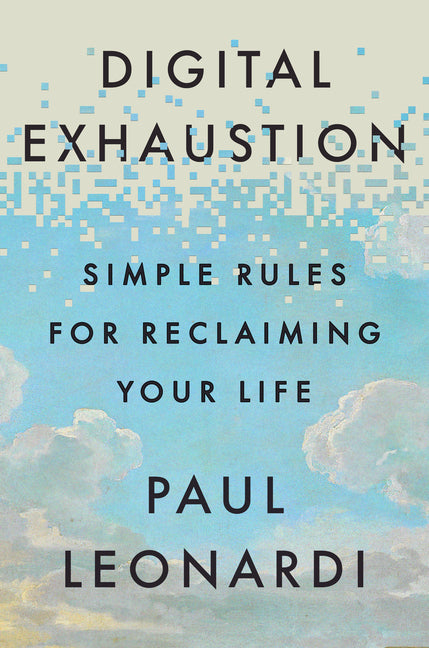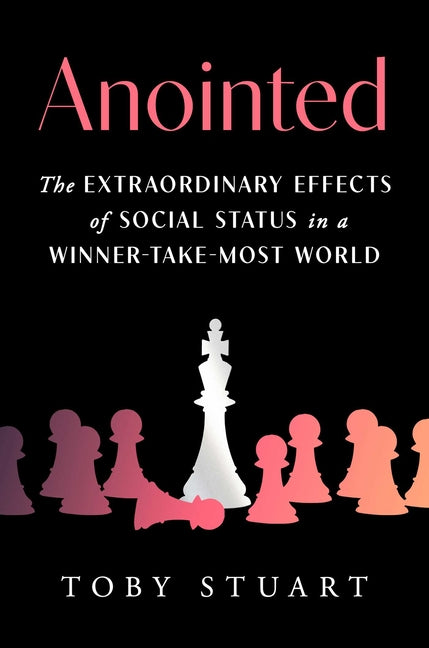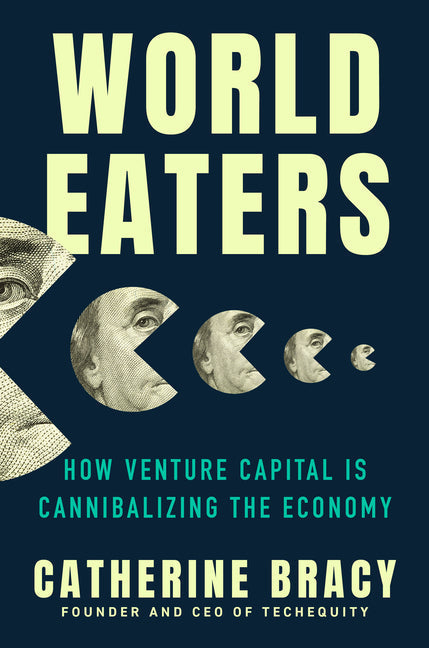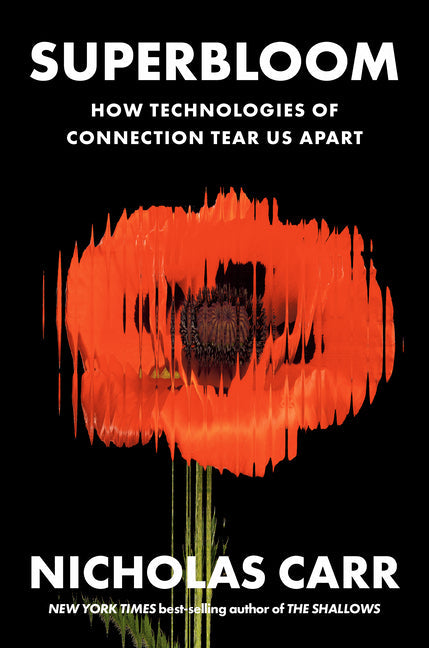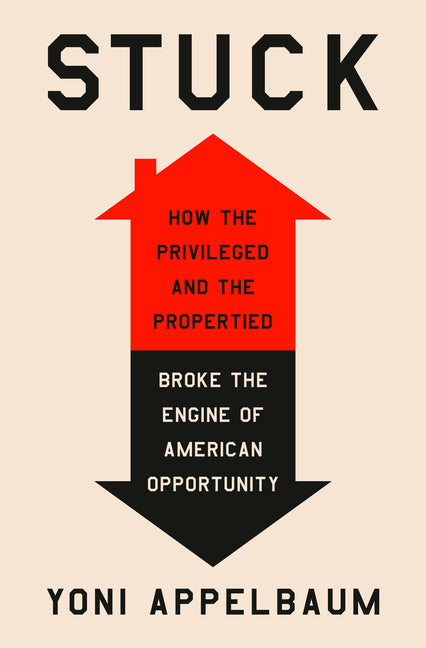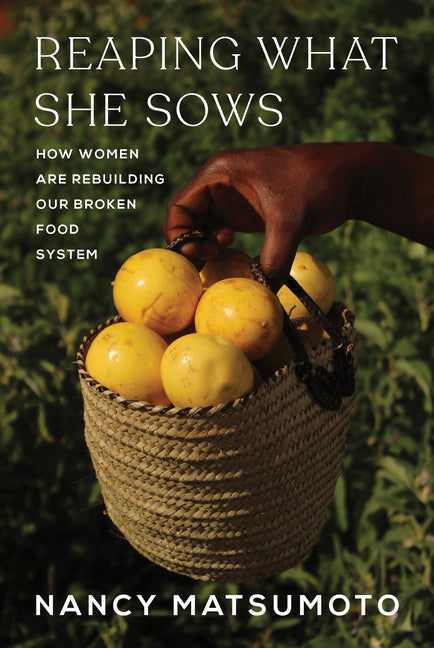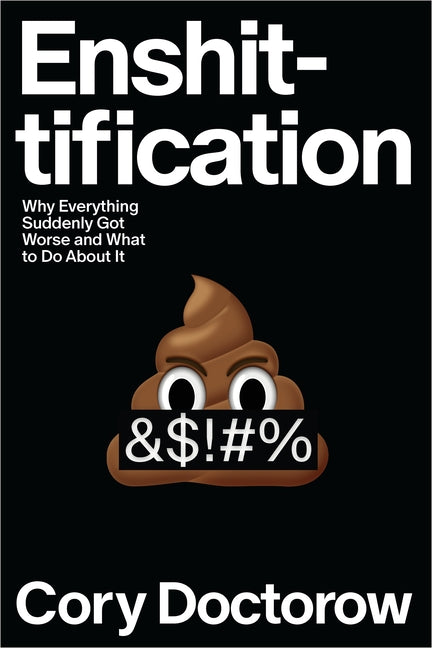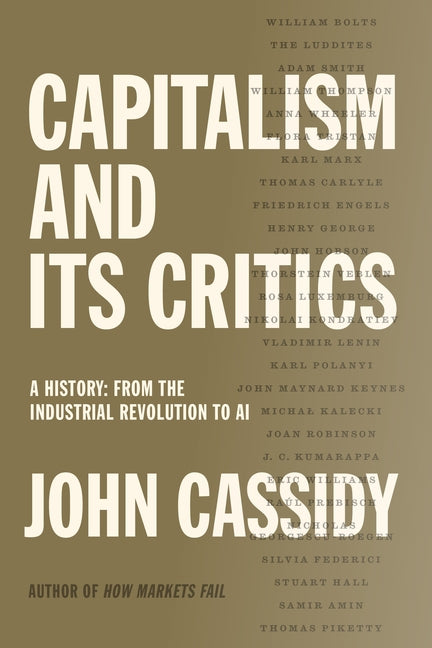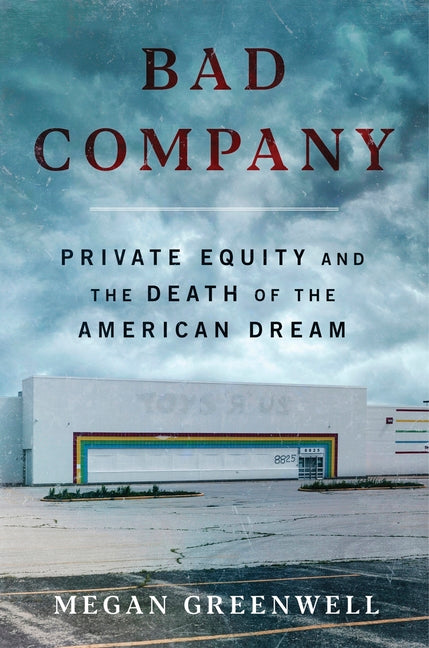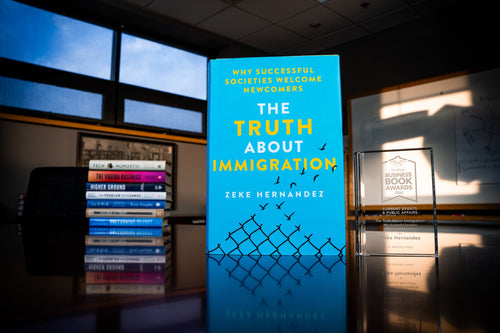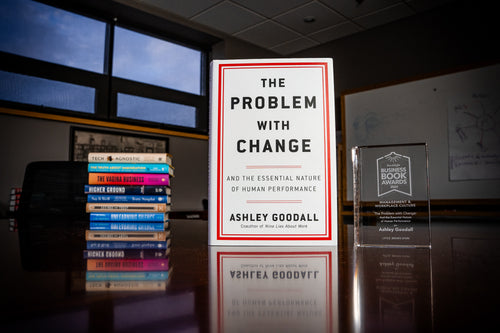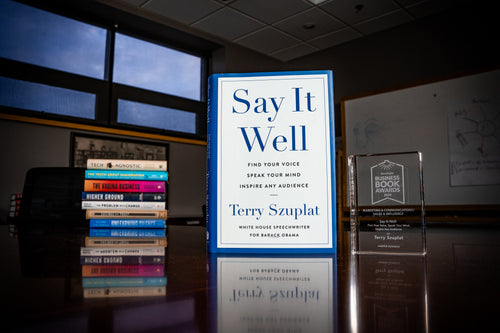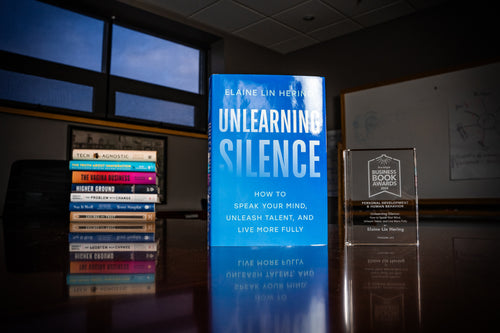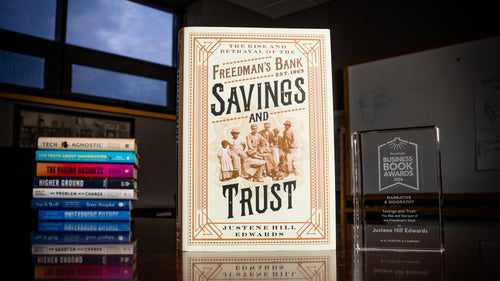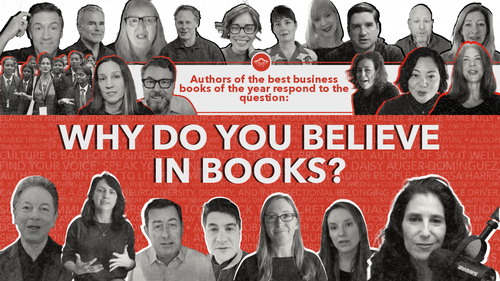The 2023 Porchlight Business Book Awards | Big Ideas & New Perspectives
I’m someone who’s prone to over-intellectualizing things, turning a problem around and around in my head and throwing myself into research to try and find the most optimal solution. Sometimes this trait serves me well, but often, I find myself lost in the weeds, too focused on the details and forgetting to zoom out and see the solutions that are already there.
How do we make our workplaces better? How do we improve our lives? How do we make the world a better place? There are scores of books coming out each year trying to offer new takes on these questions, more than any one person can parse through (although we tried our best). It's a great time to be a reader—there are endless ideas to feast on.
Yet while I was reading for the category of Big Ideas & New Perspectives, I found myself drawn in less by sheer novelty and more by the books that asked readers to slow down, to remember their fundamentals. Like a concert pianist playing scales, like a boxer throwing the same punch a hundred times, part of our practice as readers and changemakers should be remembering the most basic elements of what makes us good human beings to one another. We need to maintain a foundation of care.
Not a commercialized care. Not care through words without actions. We need to sustain a real, genuine care for one another that lets us see one another as people—complex, emotional, individual—rather than as workers or consumers or “the other.” Upon this foundation, all other ideas and strategies will flourish. Without it, little will.
The books in this category follow an interesting arc, taking readers from birth to death and exploring how the need for care and compassion is present through every stage of our lives. I didn’t intend for this pattern to arise, but I’m delighted that it did—books have an inexplicable magic in that way that I find best to simply accept.
…
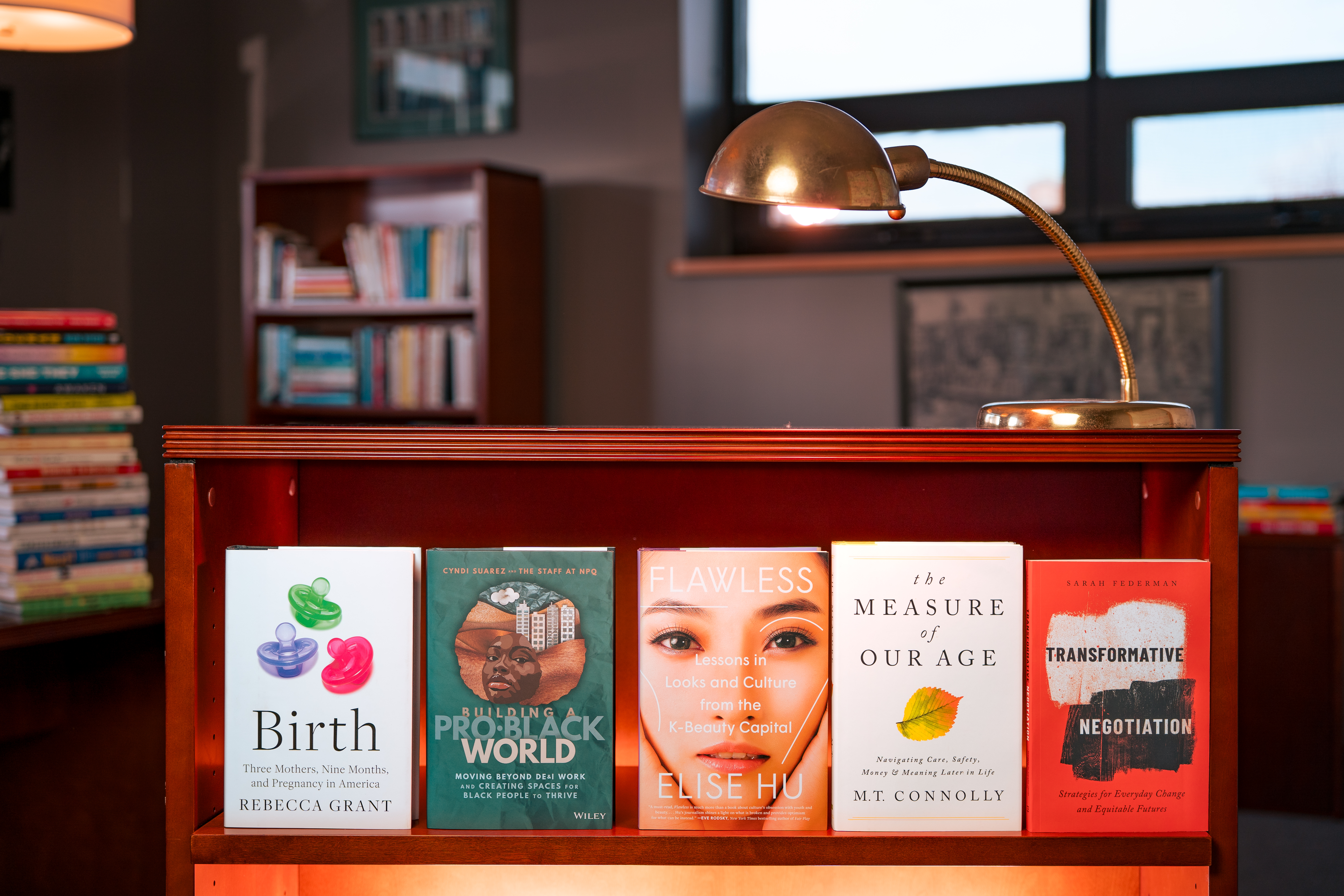
Birth: Three Mothers, Nine Months, and Pregnancy in America by Rebecca Grant, Avid Reader Press
Women gave birth at home, attended by a midwife—usually an esteemed and trusted older woman who had already given birth to her own children—and surrounded by female family members, friends, and neighbors. It was an occasion for women to come together and care for one another, providing support, solidarity, comfort, and practical aid.
The healthcare system in the United States is deeply fraught—many of us know this from firsthand experience, and it seems that the list of ways the medical system fails us is never-ending.
In Birth, journalist Rebecca Grant notes that childbirth used to be deeply rooted in the community. Through midwife-led births, women were cared for in their own homes and surrounded by people they trusted. Time-tested knowledge around childbirth and childrearing was passed down with the understanding that these new mothers might one day step into the role of midwives themselves. When male physicians started to get involved in the late 1700s, they introduced obstetric tools and surgical procedures to make labor a more expedient process. Childbirth these days is virtually an identical, assembly line process for every birthing person in the United States, yet maternal and infant health outcomes are significantly lower here than in comparable industrialized countries.
As Grant follows three women going through their pregnancy at Andaluz Waterbirth Center in Portland, readers get to see what it’s like when medical professionals make genuine care the foundation of their work, rather than convenience and profit. The point of the book isn’t to present midwife-led birth as the magic solution to all childbirth in the United States—many pregnant people do benefit from the tools and technologies available in hospitals. Rather, it argues for the availability of choice and self-advocacy.
For young professionals looking to start their families in the next few years, Birth is a necessary read—after I finished this book, I immediately overhauled my entire medical care team and am thankful to have found a doctor and a nurse-midwife who are both willing to listen and collaborate with me and make me feel like an active participant in my own care. For anyone else, this book is an excellent example of how collaboration, rather than imposition, benefits us all.
Read an excerpt from the book here
Building a Pro-Black World: Moving Beyond DE&I Work and Creating Spaces for Black People to Thrive by Cyndi Suarez and the Staff at NPQ, Wiley
The sacred nature of our connection does not preclude conflict, disagreements, misunderstandings, hurt feelings. We affect one another. It is important that we understand the impacts we are having: what we are doing and how we are being and what effect it is having on our collective change efforts. At the most basic level, it is about giving and receiving feedback, about holding on another to our best possible selves. We deserve that. It is why we are trying to change the world. We know a better one is possible.
In her acceptance speech at the 2024 Emmy Awards, actress Niecy Nash-Betts concluded, “Finally, I accept this award on behalf of every Black and Brown woman who has gone unheard yet overpoliced. Like Glenda Cleveland. Like Sandra Bland. Like Breonna Taylor. As an artist, my job is to speak truth to power, and baby, I’ma do it ’til the day I die.”
I don’t think it’s radical to say that the United States was built on a foundation of violence—from the displacement of Native Americans to the forced importation of enslaved Africans—and that this violence has continued through the present day against various communities in both obvious and insidious ways. As Rebecca Grant notes in Birth, the maternal mortality rate among Black mothers is more than three times that of White mothers. Black women earn an estimated 67 cents to White men’s dollar for the same job. The organization Mapping Police Violence estimates that Black people in the United States are almost three times more likely than White people to be killed by police.
Many of the books submitted for consideration this year have mentioned the murder of George Floyd as an opening of the floodgates that caused leaders across various industries to stop and consider whether they could build more equitable workplaces. We recognize that it was a Black man’s untimely death that sparked a need for change, yet when we talk about solutions, our conversations suddenly become color-blind. We talk about making spaces better for everyone when we really should be talking explicitly about making spaces better for Black people.
This is the basis of Building a Pro-Black World, an anthology of essays and interviews by nonprofit professionals and writers who have come together to posit that, by building systems that benefit the most marginalized among us, everyone benefits as a result. It’s necessary, yes, to identify the ways that white supremacy has been embedded in our organizations—these manifest in characteristics such as perfectionism, power hoarding, quantity over quality, so on—and to work on extricating them from our work cultures. But we also need to rebuild a better system in its place, and this can only be done by collaborating and elevating the people who have long gone, as Nash-Betts said, “unheard yet overpoliced.”
What does Black (or Brown, or Asian, or Indigenous) leadership look like? “We are developing practices,” write Liz Derias and Kad Smith, “about values that our Black staff members hold in high regard, such as communalism, self-care, authenticity, distribution of power, transparency, and healing.” The foundation here, once again, is care for one another. We can’t just adopt these ideas, however—we must actively elevate marginalized people to lead the rebuilding of more equitable systems.
Read an excerpt from the book here
Flawless: Lessons in Looks and Culture from the K-Beauty Capital by Elise Hu, Dutton
The ajummas show us a way to preserve and celebrate our bodies without forcing them into any rigid norms; to reject factory-issued beauty standards but arrive at the best version of our selves at whichever age we’re at. Their kind of self-care emphasizes caring for one another, the pleasures of bodily movement, and nurturing touch over product purchases. It accepts both getting old and not necessarily being pretty. It considers community and reciprocity. In other words, body care in old age is a way to enjoy it and feel satisfied with it. Theirs is a form of body work that nurtures the soul.
We live in an exhausting society! Everyone is burnt out all the time!
The reasons for our burnout are systemic—as Emily and Amelia Nagoski noted in the book Burnout, women in particular face insidious forces such as unequal pay, the expectation to be selfless caregivers, and unrealistic body and appearance standards. Yet we’re also expected to solve these issues at the individual level. For example, I can’t singlehandedly solve any of these societal issues on my own, but I can drop a few $3 K-beauty sheet masks into my Target cart to carve out a temporary reprieve from my daily stressors for a few minutes—and come out the other side with smooth, hydrated skin.
A multi-billion-dollar industry has sprung up to offer us these temporary fixes, and NPR report Elise Hu takes readers into the very heart of the K-beauty industry in Flawless. Following a stint living in Seoul as NPR’s first Korea and Japan bureau chief, Hu explores how South Korean women have made their way through a deeply appearance-based society—not unlike our own society here in the United States, except that in South Korea, people are willing to admit it openly. “Seoul is not a place where ‘accepting the skin you’re in’ is de rigueur,” she writes. Hu explores and engages in Korean beauty culture, finding enjoyment in it yet also feeling the weight of trying to meet impossible, ever-shifting appearance standards.
There is nothing inherently wrong with visiting a spa or buying a new beauty product, Hu argues, but it’s worth pausing to take note of why we’re engaging in some of these practices. Do they genuinely make us feel better? Do they help us connect with others? Or are we simply trapped in the same cycle of consumerism that exhausted us to begin with, hoping that a new cream or serum will fix the problems that ail us? Spending time with a group of ajummas (elderly Korean women), Hu is inspired by the genuine joy these women—who are free “from the most competitive arenas of contemporary life, like searching for a job or a mate”—exude. They still engage in beauty rituals, but they do so to stay connected, for example, with the estheticians and hairstylists who know them and can offer a soothing touch during an otherwise increasingly lonely time of their lives.
“The focus,” Hu writes, “isn’t to attain the reigning beauty standard but instead to demonstrate care within the community. It’s about reciprocity, not competition. Maintaining an acceptable appearance helps grease social connection, which redounds to both ends of a relationship.”
How much more could we accomplish if we all took on this community-centered view? Perhaps we could finally dismantle the societal inequities that have kept us all exhausted and disconnected from one another.
Read an excerpt from the book here
The Measure of Our Age: Navigating Care, Safety, Money, and Meaning Later in Life by M.T. Connolly, JD, PublicAffairs
Decades of studies have looked at love from countless perspectives. The unambiguously clear conclusion is that human connection and love lengthen lives and improve both physical and mental health. If meaning is the question, love is the answer.
Advances in medicine, infrastructure, and technology mean we’re living longer lives than our ancestors, yet the systems around us have yet to catch up. There are too many stories of elder abuse and neglect at understaffed, underfunded nursing homes. Family members are left to juggle caring for elderly relatives with no additional financial support due to a twisted argument that caregiving is a labor of love (which it is) and tying an act of love to a need for money is crass. As a society, we’re focused on reproducing and raising the next generation—the next wave of workers and consumers—yet have very few safeguards in place to give our elders a comfortable and safe ending.
The Measure of Our Age dives into all the ways that the current situation fails our elders and a call to action that we demand change on behalf of the people who have loved us and raised us. M.T. Connolly weaves research with the story of her aging father, who passed away shortly before the book was completed.
“We can’t stop aging,” Connolly writes, “but we could do so much more to stop the needless suffering that attends it.” Many of the changes needed are difficult, requiring us to band together, to vote for more compassionate elected officials, to lobby them to pass sweeping legal changes to our elder care system. But some of these changes are accessible, and they can make us better people in any facet of our lives. Connolly invites readers to adopt habits of curiosity and play, to find awe in the things around us, to help one another find purpose in our work and lives, and to engage in a lifelong practice of storytelling. “Cumulatively, experience from the many, woven into stories, can change culture and consciousness, which in turn can change politics, law, and policy. Stories are upstream from all of it.” These are all skills we have intuitively as children, but that we fail to nourish over time. Returning to these basics can begin to sow deep, fundamental change that uplifts everyone.
Read an excerpt from the book here
Transformative Negotiation: Strategies for Everyday Change and Equitable Futures by Sarah Federman, University of California Press
A politics of care could transform the carceral system, schools, and every aspect of our society. Without care at the center, no policy change will be sufficient. Negotiators who place care centrally in their work will find their relationships and communities enriched.
Once we’ve identified the ways we want to see the world change, how do we make it happen? It requires a lifelong commitment to negotiation—negotiating for ourselves, for our families, for our coworkers, for our communities, and so on. Negotiation is a practice many of us shy away from because it feels adversarial. But what if it didn’t have to be?
In Transformative Negotiation, Sarah Federman draws from the wisdom of her students at the University of Baltimore. When she began teaching there, she initially offered examples of negotiation based around corporate deals and hostage situations—situations that were unrelatable, that didn’t transfer readily to the students’ lived experiences. What they wanted to learn was how to negotiate to improve their economic standing, or reconnect with an estranged family member, or change a policy affecting their neighborhood.
Transformative Negotiation takes into account the fact that a negotiation tactic that works for a White man in a corporate boardroom will rarely work for—and can in fact be dangerous for—a Saudi doctoral student trying to prevent her husband from taking away her children, for example. It considers the fact that, where the dominant narrative in the business world is that everything is a zero-sum game made up of winners and losers, most individuals simply want to find a solution that benefits as many people as possible and preserves community bonds.
The goal, Federman writes, is to offer “a way to break glass ceilings without leaving everyone else under the shards. We do this by rebuilding trust rather than through domination.” This means treating everyone we encounter with dignity and respect, trusting them to make their own decisions, and treating negotiation as a tool for peacebuilding.
As with every other book in this category, it all comes down to the basics: treating others the way we hope to be treated, too.
Read an excerpt from the book here

